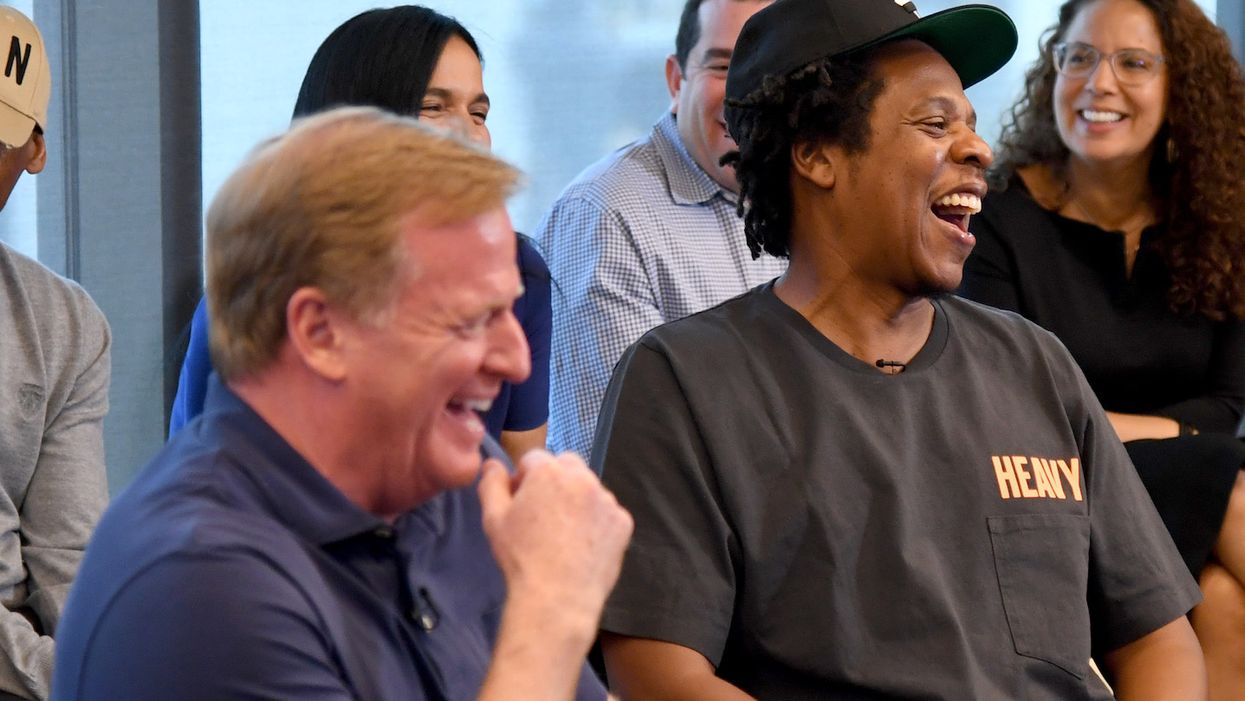
NFL Commissioner Roger Goodell and rapper Jay-Z. (Kevin Mazur/Getty Images for Roc Nation)

Neither Jay-Z, nor anyone else, should have to answer to him.
When Jay-Z, given name Shawn Carter, entered a partnership with the NFL to "enhance the NFL's live game experiences and to amplify the league's social justice efforts," he became a target of some harsh and hypocritical attacks from allies of former NFL quarterback and current activist Colin Kaepernick, who were upset that the rapper and businessman did not consult with them on the deal.
There was Eric Reid, the Carolina Panthers defensive back who began taking a knee during the national anthem when Colin Kaepernick did, and has continued the protest ever since. Reid called it "despicable" that Jay-Z would partner with the league after claiming to support Kaepernick.
This is the same Eric Reid who has continued taking multimillion dollar paychecks from NFL teams in the years since Kaepernick was allegedly blackballed for the same protests that Reid and other active players continue today, with no consequences.
The same Eric Reid who, along with Kaepernick, accepted a $10 million settlement deal from the NFL with an agreement to drop their grievance claiming that NFL owners colluded to ban Kaepernick for kneeling.
As for Kaepernick, he hasn't spoken publicly for himself about the deal, because he rarely says anything publicly. But, his girlfriend and his lawyer have served as his surrogates, relaying his displeasure with Jay-Z to the media.
His girlfriend, Nessa Diab, said it was "disgusting and disappointing" that Jay-Z would allow the NFL to use him to help bury Kaepernick. His lawyer, Mark Geragos, called the deal "cold-blooded" and said it "crossed the intellectual picket line."
Reid accused Jay-Z of making a "money move" to bury Kaepernick. So what did he call it when he and Kaepernick accepted millions to stop fighting the NFL and its team owners in an attempt to get him back in the league? Isn't that a "money move?"
Speaking of money moves, Kaepernick has made a few himself since his allegedly undesired retirement began. He's signed a $1 million dollar book deal, and signed an endorsement deal with Nike on par with what a star NFL player would get — a deal more lucrative than anything he earned from Nike while playing football.
Not to mention there are reports and rumors, albeit unverified, that Kaepernick had opportunities to sign with NFL teams over the last few years, but either he wanted more money than was being offered or he wanted to start but was being offered only backup roles. We do know that when the XFL and the Alliance of American Football inquired about Kaepernick's interest in the minor pro leagues, he asked for $20 million. Those leagues pay six-figure salaries, max.
All of three of the Kaepernick allies decried the fact that Kaepernick wasn't consulted before the Jay-Z/NFL deal was done. But what exactly puts Kaepernick in such a lofty position as to be the gatekeeper of who can participate in social justice? Why would someone like Jay-Z need permission from Colin Kaepernick to work with the NFL?
This is not new for the Kaepernick crew. Reid was once part of The Players Coalition, a group founded in 2017 to advocate for social justice and racial equality. The coalition was negotiating with the league over how to move past national anthem protests and toward agreeable and meaningful community impact.
As the coalition neared a deal to dedicate $90 million to combat social inequality, Reid split from the group over the fact that Kaepernick's employment status was not given top priority in the negotiations. Josh Norman, one of the players in the coalition, said Reid's presence in the coalition was "toxic" and "creating so much chaos." In fact, Reid's actions, at one point, threatened the deal with the NFL.
What's more important to Kaepernick and his supporters? His personal feud with the NFL (which, again, he agreed to drop in exchange for millions of dollars) or tangible investment in social justice causes? How many millions of dollars, that could be used to change lives, is it worth for them to hold out for Kaepernick to play football again? As Jay-Z himself asked in defending the deal: "Will we get stuck on Colin not having a job?"
It's important to remember that celebrity social justice warriors are not just benevolent givers who have no self-interest or ulterior motives. Kaepernick and Jay-Z have done a lot of good for communities in need, and will likely continue to do so. But they also won't hesitate to cash a check when the opportunity arises.
There's no doubt that Jay-Z and his company, Roc Nation, stand to profit from this deal. And while Kaepernick isn't earning an NFL paycheck anymore, there's no doubt that he has found ways to profit from his own social justice endeavors. And that's okay. Profit is not evil.
That's what makes the virtue signaling from Kaepernick's people so bizarre. Everyone involved in this has NFL money in their bank accounts. How can it be right to play for the NFL, and right to accept a hush money settlement over the alleged blackballing of Kaepernick, but wrong to do business with the league, business that could also benefit others?
Kaepernick doesn't have to answer to anyone for how he does his business, how he advances social justice causes, or how he protests, nor does Reid. And Kaepernick made it clear that he will not do so. So the last thing Jay-Z, or The Players Coalition, or anyone else is obligated to do is call Colin Kaepernick for permission to do some good of their own.